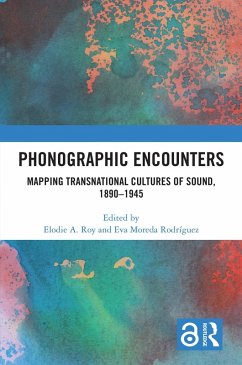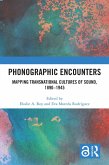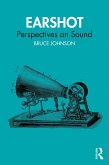Phonographic Encounters (eBook, PDF)
Mapping Transnational Cultures of Sound, 1890-1945
Redaktion: Roy, Elodie A.; Moreda Rodriguez, Eva
41,95 €
41,95 €
inkl. MwSt.
Sofort per Download lieferbar

21 °P sammeln
41,95 €
Als Download kaufen

41,95 €
inkl. MwSt.
Sofort per Download lieferbar

21 °P sammeln
Jetzt verschenken
Alle Infos zum eBook verschenken
41,95 €
inkl. MwSt.
Sofort per Download lieferbar
Alle Infos zum eBook verschenken

21 °P sammeln
Phonographic Encounters (eBook, PDF)
Mapping Transnational Cultures of Sound, 1890-1945
Redaktion: Roy, Elodie A.; Moreda Rodriguez, Eva
- Format: PDF
- Merkliste
- Auf die Merkliste
- Bewerten Bewerten
- Teilen
- Produkt teilen
- Produkterinnerung
- Produkterinnerung

Bitte loggen Sie sich zunächst in Ihr Kundenkonto ein oder registrieren Sie sich bei
bücher.de, um das eBook-Abo tolino select nutzen zu können.
Hier können Sie sich einloggen
Hier können Sie sich einloggen
Sie sind bereits eingeloggt. Klicken Sie auf 2. tolino select Abo, um fortzufahren.

Bitte loggen Sie sich zunächst in Ihr Kundenkonto ein oder registrieren Sie sich bei bücher.de, um das eBook-Abo tolino select nutzen zu können.
With case studies from China, Australia, the United States, Latin America, Russia, Sweden, Germany, Spain, Portugal, France, and Italy, Phonographic Encounters explores moments of interaction and encounter, as well as tensions, between local and global understandings of recording technologies.
- Geräte: PC
- mit Kopierschutz
- eBook Hilfe
Andere Kunden interessierten sich auch für
![Phonographic Encounters (eBook, ePUB) Phonographic Encounters (eBook, ePUB)]() Phonographic Encounters (eBook, ePUB)41,95 €
Phonographic Encounters (eBook, ePUB)41,95 €![The Screen Music of Trevor Jones (eBook, PDF) The Screen Music of Trevor Jones (eBook, PDF)]() David CooperThe Screen Music of Trevor Jones (eBook, PDF)41,95 €
David CooperThe Screen Music of Trevor Jones (eBook, PDF)41,95 €![Musical Listening in the Age of Technological Reproduction (eBook, PDF) Musical Listening in the Age of Technological Reproduction (eBook, PDF)]() Musical Listening in the Age of Technological Reproduction (eBook, PDF)41,95 €
Musical Listening in the Age of Technological Reproduction (eBook, PDF)41,95 €![Voicing Girlhood in Popular Music (eBook, PDF) Voicing Girlhood in Popular Music (eBook, PDF)]() Voicing Girlhood in Popular Music (eBook, PDF)43,95 €
Voicing Girlhood in Popular Music (eBook, PDF)43,95 €![Electro Swing (eBook, PDF) Electro Swing (eBook, PDF)]() Chris InglisElectro Swing (eBook, PDF)41,95 €
Chris InglisElectro Swing (eBook, PDF)41,95 €![Earshot (eBook, PDF) Earshot (eBook, PDF)]() Bruce JohnsonEarshot (eBook, PDF)40,95 €
Bruce JohnsonEarshot (eBook, PDF)40,95 €![Polish Estrada Music (eBook, PDF) Polish Estrada Music (eBook, PDF)]() Ewa MazierskaPolish Estrada Music (eBook, PDF)41,95 €
Ewa MazierskaPolish Estrada Music (eBook, PDF)41,95 €-
-
-
With case studies from China, Australia, the United States, Latin America, Russia, Sweden, Germany, Spain, Portugal, France, and Italy, Phonographic Encounters explores moments of interaction and encounter, as well as tensions, between local and global understandings of recording technologies.
Dieser Download kann aus rechtlichen Gründen nur mit Rechnungsadresse in A, B, BG, CY, CZ, D, DK, EW, E, FIN, F, GR, HR, H, IRL, I, LT, L, LR, M, NL, PL, P, R, S, SLO, SK ausgeliefert werden.
Produktdetails
- Produktdetails
- Verlag: Taylor & Francis
- Seitenzahl: 284
- Erscheinungstermin: 1. September 2021
- Englisch
- ISBN-13: 9781000427271
- Artikelnr.: 62167709
- Verlag: Taylor & Francis
- Seitenzahl: 284
- Erscheinungstermin: 1. September 2021
- Englisch
- ISBN-13: 9781000427271
- Artikelnr.: 62167709
- Herstellerkennzeichnung Die Herstellerinformationen sind derzeit nicht verfügbar.
Elodie A. Roy is a media and material culture theorist. She is the author of Media, Materiality and Memory: Grounding the Groove (Routledge). Eva Moreda Rodríguez is Senior Lecturer in Musicology at the University of Glasgow and the author of two books on music and politics in Francoist Spain. Her research into early recordings in Spain has received funding from the AHRC and the British Academy.
Introduction
Part I: Negotiating Geographical and Cultural Boundaries: Intermediaries,
Traders and Operators
Chapter 1. Sergio Ospina Romero, "Recording Studios on Tour: Traveling
Ventures at the Dawn of the Music Industry"
Chapter 2. Andreas Steen, "Global Transfer, Local Realities: Early
Phonographic Practices and Challenges in China (1900-1914)"
Chapter 3. Henry Reese, "Settler Colonial Soundscapes: Phonograph
Demonstrations in 1890s Australia"
Part II: Repertoires, Auditory Practices and the Shaping of New Listening
Identities
Chapter 4. João Silva, "Portugal and Mechanical Music in the Early
Phonographic Era: An Intermedial Approach"
Chapter 5. Eva Moreda Rodríguez, "Discòfils: Notes on the Birth of the
Record Club and the Record Listener in 1930s Barcelona"
Chapter 6. Ulrik Volgsten, "Mediatization of Music, Musicalization of
Everyday Life: New Ways of Listening to Recorded Sound in Sweden during the
Interwar Years, 1919-1939"
Part III: Phonography and the Reordering of Knowledge and Sensibilities /
Phonography as Ideology
Chapter 7. Karina Zybina, "Recording music, making business: The Russian
recording industry at the beginning of the 20th century"
Chapter 8. Benedetta Zucconi, "'Phonographic Awareness': Recorded Sound in
Early Twentieth-Century Italy between Aesthetic Questions and Economic
Struggles"
Chapter 9. Britta Lange, "The Construction of "das Volk" through Acoustic
Knowledge. Recordings of "Ethnic German Repatriates" from the Institute for
Acoustic Research, 1940-1941"
Part IV: The Heterogeneous Geographies of Consumption
Chapter 10. Jacques Vest, "The Aesthetic of Arrest: The Victor Talking
Machine Company's Ready Made Windows Program, 1909-1913"
Chapter 11. Siel Agugliaro, "The Phonograph as a Transnational Tool:
Selling Music Records in Philadelphia's Little Italy, 1900s-1920s"
Chapter 12. Thomas Henry, "From the Grands Boulevards to Montparnasse: An
Essay on the Geohistory of the Phonograph and Sound Recording Business in
Paris (1878-1940)"
Conclusion
Part I: Negotiating Geographical and Cultural Boundaries: Intermediaries,
Traders and Operators
Chapter 1. Sergio Ospina Romero, "Recording Studios on Tour: Traveling
Ventures at the Dawn of the Music Industry"
Chapter 2. Andreas Steen, "Global Transfer, Local Realities: Early
Phonographic Practices and Challenges in China (1900-1914)"
Chapter 3. Henry Reese, "Settler Colonial Soundscapes: Phonograph
Demonstrations in 1890s Australia"
Part II: Repertoires, Auditory Practices and the Shaping of New Listening
Identities
Chapter 4. João Silva, "Portugal and Mechanical Music in the Early
Phonographic Era: An Intermedial Approach"
Chapter 5. Eva Moreda Rodríguez, "Discòfils: Notes on the Birth of the
Record Club and the Record Listener in 1930s Barcelona"
Chapter 6. Ulrik Volgsten, "Mediatization of Music, Musicalization of
Everyday Life: New Ways of Listening to Recorded Sound in Sweden during the
Interwar Years, 1919-1939"
Part III: Phonography and the Reordering of Knowledge and Sensibilities /
Phonography as Ideology
Chapter 7. Karina Zybina, "Recording music, making business: The Russian
recording industry at the beginning of the 20th century"
Chapter 8. Benedetta Zucconi, "'Phonographic Awareness': Recorded Sound in
Early Twentieth-Century Italy between Aesthetic Questions and Economic
Struggles"
Chapter 9. Britta Lange, "The Construction of "das Volk" through Acoustic
Knowledge. Recordings of "Ethnic German Repatriates" from the Institute for
Acoustic Research, 1940-1941"
Part IV: The Heterogeneous Geographies of Consumption
Chapter 10. Jacques Vest, "The Aesthetic of Arrest: The Victor Talking
Machine Company's Ready Made Windows Program, 1909-1913"
Chapter 11. Siel Agugliaro, "The Phonograph as a Transnational Tool:
Selling Music Records in Philadelphia's Little Italy, 1900s-1920s"
Chapter 12. Thomas Henry, "From the Grands Boulevards to Montparnasse: An
Essay on the Geohistory of the Phonograph and Sound Recording Business in
Paris (1878-1940)"
Conclusion
Introduction
Part I: Negotiating Geographical and Cultural Boundaries: Intermediaries,
Traders and Operators
Chapter 1. Sergio Ospina Romero, "Recording Studios on Tour: Traveling
Ventures at the Dawn of the Music Industry"
Chapter 2. Andreas Steen, "Global Transfer, Local Realities: Early
Phonographic Practices and Challenges in China (1900-1914)"
Chapter 3. Henry Reese, "Settler Colonial Soundscapes: Phonograph
Demonstrations in 1890s Australia"
Part II: Repertoires, Auditory Practices and the Shaping of New Listening
Identities
Chapter 4. João Silva, "Portugal and Mechanical Music in the Early
Phonographic Era: An Intermedial Approach"
Chapter 5. Eva Moreda Rodríguez, "Discòfils: Notes on the Birth of the
Record Club and the Record Listener in 1930s Barcelona"
Chapter 6. Ulrik Volgsten, "Mediatization of Music, Musicalization of
Everyday Life: New Ways of Listening to Recorded Sound in Sweden during the
Interwar Years, 1919-1939"
Part III: Phonography and the Reordering of Knowledge and Sensibilities /
Phonography as Ideology
Chapter 7. Karina Zybina, "Recording music, making business: The Russian
recording industry at the beginning of the 20th century"
Chapter 8. Benedetta Zucconi, "'Phonographic Awareness': Recorded Sound in
Early Twentieth-Century Italy between Aesthetic Questions and Economic
Struggles"
Chapter 9. Britta Lange, "The Construction of "das Volk" through Acoustic
Knowledge. Recordings of "Ethnic German Repatriates" from the Institute for
Acoustic Research, 1940-1941"
Part IV: The Heterogeneous Geographies of Consumption
Chapter 10. Jacques Vest, "The Aesthetic of Arrest: The Victor Talking
Machine Company's Ready Made Windows Program, 1909-1913"
Chapter 11. Siel Agugliaro, "The Phonograph as a Transnational Tool:
Selling Music Records in Philadelphia's Little Italy, 1900s-1920s"
Chapter 12. Thomas Henry, "From the Grands Boulevards to Montparnasse: An
Essay on the Geohistory of the Phonograph and Sound Recording Business in
Paris (1878-1940)"
Conclusion
Part I: Negotiating Geographical and Cultural Boundaries: Intermediaries,
Traders and Operators
Chapter 1. Sergio Ospina Romero, "Recording Studios on Tour: Traveling
Ventures at the Dawn of the Music Industry"
Chapter 2. Andreas Steen, "Global Transfer, Local Realities: Early
Phonographic Practices and Challenges in China (1900-1914)"
Chapter 3. Henry Reese, "Settler Colonial Soundscapes: Phonograph
Demonstrations in 1890s Australia"
Part II: Repertoires, Auditory Practices and the Shaping of New Listening
Identities
Chapter 4. João Silva, "Portugal and Mechanical Music in the Early
Phonographic Era: An Intermedial Approach"
Chapter 5. Eva Moreda Rodríguez, "Discòfils: Notes on the Birth of the
Record Club and the Record Listener in 1930s Barcelona"
Chapter 6. Ulrik Volgsten, "Mediatization of Music, Musicalization of
Everyday Life: New Ways of Listening to Recorded Sound in Sweden during the
Interwar Years, 1919-1939"
Part III: Phonography and the Reordering of Knowledge and Sensibilities /
Phonography as Ideology
Chapter 7. Karina Zybina, "Recording music, making business: The Russian
recording industry at the beginning of the 20th century"
Chapter 8. Benedetta Zucconi, "'Phonographic Awareness': Recorded Sound in
Early Twentieth-Century Italy between Aesthetic Questions and Economic
Struggles"
Chapter 9. Britta Lange, "The Construction of "das Volk" through Acoustic
Knowledge. Recordings of "Ethnic German Repatriates" from the Institute for
Acoustic Research, 1940-1941"
Part IV: The Heterogeneous Geographies of Consumption
Chapter 10. Jacques Vest, "The Aesthetic of Arrest: The Victor Talking
Machine Company's Ready Made Windows Program, 1909-1913"
Chapter 11. Siel Agugliaro, "The Phonograph as a Transnational Tool:
Selling Music Records in Philadelphia's Little Italy, 1900s-1920s"
Chapter 12. Thomas Henry, "From the Grands Boulevards to Montparnasse: An
Essay on the Geohistory of the Phonograph and Sound Recording Business in
Paris (1878-1940)"
Conclusion







